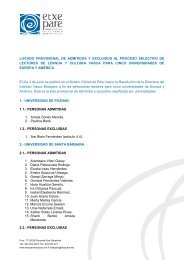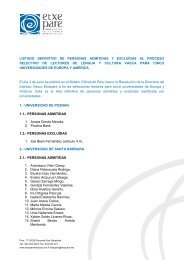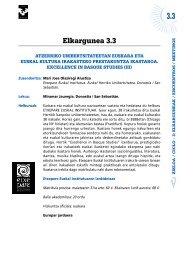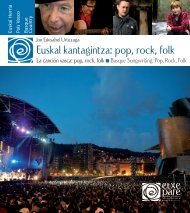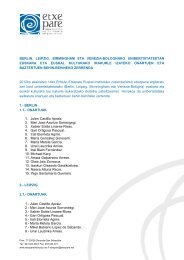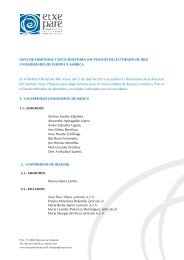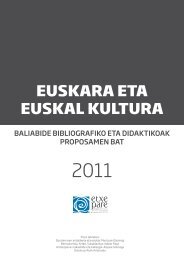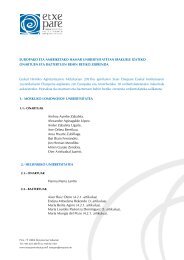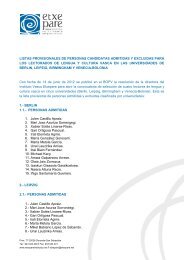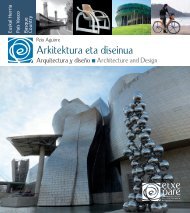Euskal sukaldaritzaz - Etxepare, Euskal Institutua
Euskal sukaldaritzaz - Etxepare, Euskal Institutua
Euskal sukaldaritzaz - Etxepare, Euskal Institutua
You also want an ePaper? Increase the reach of your titles
YUMPU automatically turns print PDFs into web optimized ePapers that Google loves.
dades de que nos guste. Cuando un preparado culinario<br />
toca nuestra memoria, tendemos a valorar<br />
positivamente lo que comemos. En gran medida,<br />
reconocer es disfrutar.<br />
Quizás por ello estamos necesitados de la cultura y<br />
de la educación a la hora de acceder a lo nuevo: lo<br />
que se desconoce provoca inquietud. Bien es cierto<br />
que hemos adelantado mucho en los últimos tiempos,<br />
y que ya casi nos atrevemos con todo. Alimentos<br />
extraños y preparados de lo más exótico, entran<br />
hoy por nuestras bocas. La información nos ha hecho<br />
más abiertos: me imagino la cara que pondría alguno<br />
de mis difuntos abuelos, por ejemplo, ante un plato<br />
de sushi, sin ir más lejos. O lo que pensarían de comer<br />
branquias de erizo de mar.<br />
Queramos o no, siempre tendemos a buscar nuestros<br />
recuerdos constitutivos, aquellos que nos han<br />
formado desde la infancia. Es más, un bacalao, unas<br />
alubias, un guisado, un marmitako… tienen siempre<br />
parámetros comparativos, como si debiera existir un<br />
canon invariable para cada uno de ellos.<br />
Pero ¿Es esto cierto, la memoria de la cocina –¿o<br />
será, quizás, la cocina de la memoria?– es algo que<br />
perdura inalterable en el tiempo?<br />
Llegados a este punto, recuerdo una conversación<br />
con el gran cocinero Andoni Luis Aduriz. 11 En una<br />
ocasión en la que andábamos perdidos en uno de<br />
nuestros habituales amazonas verbales, se me ocurrió<br />
una idea que podía encerrar lo que nos proponíamos,<br />
es decir, creí haber dado inocentemente con<br />
la formulación que necesitábamos para cocina tradicional:<br />
“Cocina de siempre es aquella que cada cual<br />
más ha conocido”.<br />
Ni corto ni perezoso, Andoni respondió: “Entonces mi<br />
memoria, al igual que la tuya y la de todos los de nuestra<br />
generación, está llena de macarrones con tomate”.<br />
Y llevaba razón, pues casi todos es lo que más hemos<br />
comido en nuestras vidas, al menos cuando niños.<br />
Sirva la anécdota para ilustrar que estos asuntos del<br />
comer no son sencillos de responder. Por ejemplo,<br />
ing place, for example– we will in all probability like<br />
it. When a culinary creation touches our memory, we<br />
tend to positively evaluate what we are eating. To a<br />
large extent, recognition is enjoyment.<br />
Perhaps because of this we need culture and education<br />
when taking on board new things: the unknown<br />
makes us nervous. It is quite true that we have advanced<br />
greatly in recent times, and now we almost<br />
try anything. Today we eat strange foods and exotic<br />
dishes. More information has made us more open:<br />
I can only imagine the look on any of my deceased<br />
grandparents’ faces, for example, if they were to be<br />
presented with a plate of sushi, without going any<br />
further. Or what they would think about eating sea<br />
urchin gills.<br />
Whether we like it or not, we always tend to seek<br />
out or constitutive memories, those formed during<br />
infancy. Furthermore, a piece of cod, some beans,<br />
a stew, or a marmitako all have comparative parameters,<br />
as if there were an unchanging canon for each<br />
of them.<br />
Yet is this notion of culinary memory –or, perhaps,<br />
cooking from memory– correct? Is it something that<br />
endures unswervingly through time?<br />
Having reached this point, I recall a conversation<br />
with the great Basque chef Andoni Luis Aduriz. 11<br />
Once, having found ourselves lost in one of our customary<br />
verbal Amazonian forests, an idea came to<br />
me that might help finish off our conversation. In<br />
other words, I thought I had innocently come up<br />
with a formulation that we needed for traditional<br />
cuisine: “Traditional cooking is what everyone<br />
knows best”.<br />
Without thinking twice, Andoni replied: “Then my<br />
memory, just like yours and everyone else in our<br />
generation, is full of macaroni in tomato sauce.” And<br />
he was right, because for almost all of us, this is what<br />
we ate in our lives, at least when we were children.<br />
This anecdote helps to illustrate the fact that these<br />
coking issues are not easy to resolve. For example,<br />
31



